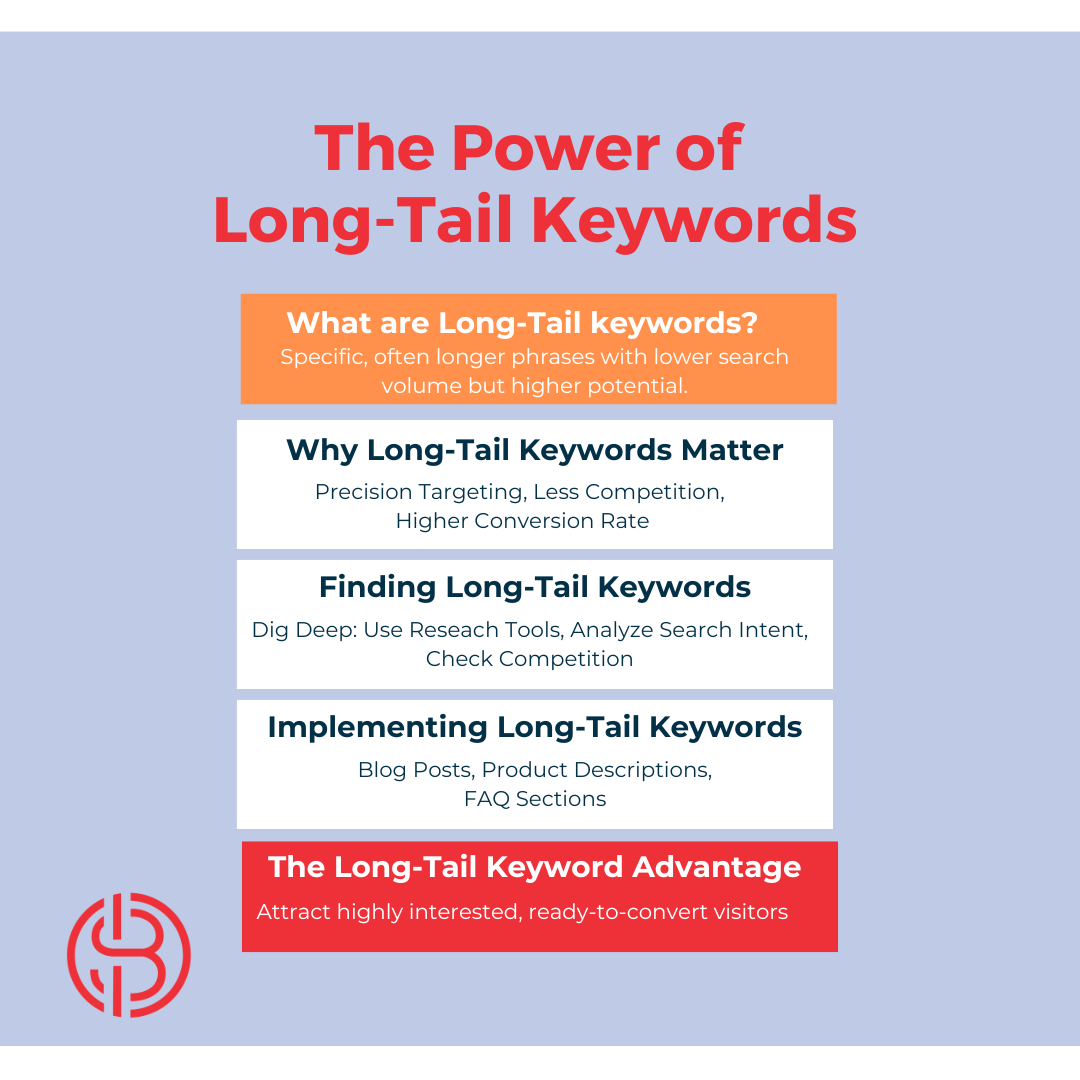Master Search Keyword Research: Unlocking Secrets
Shelly Bouse • April 14, 2025
Discover the Secrets of Effective Search Keyword Research


Key Highlights
- To boost organic traffic and climb up the search engine rankings, it's crucial to do keyword research well.
- With a keyword research tool, you can make this task easier by getting helpful info like how many people are searching for something (search volume) and ideas for keywords.
- Some top tools for finding good keywords include Google Keyword Planner, SEMrush, Ahrefs, Moz Keyword Explorer, KWFinder, Ubersuggest, and Keyword Tool.io.
- For better SEO results. It's all about picking the right words that match what people are looking for and making sure your website talks about those topics in a clear way.
- Knowing which keywords work best comes down to having accurate data on them. Also checking if your keyword tool does its job well is key to nailing your keyword strategy.
- By keeping an eye on what words competitors use successfully and understanding how SEO works can really step up your game in finding effective keywords.
For this task of finding those golden keywords, there are some tools designed just for that purpose. With these tools on hand, getting into details like how many times a month people search for something (average monthly search volume), how tough the competition is over certain words or phrases (competition), and even getting new ideas on what keywords might work well becomes a whole lot easier.
In our blog today, we’re going to take a look at some top-notch keyword research tools out there—what makes them tick and why they could be super useful to you. We'll talk about why having accurate info on keywords matters so much and how checking if a tool really does its job can save you lots of time and effort later on. Plus, we’ll share tips on doing stellar keyword research by keeping an eye on what competitors are up to and choosing smartly with help from these handy-dandy tools.
By wrapping up this read, I hope you’ll feel ready to dive deep into keyword research yourself—with all the know-how needed to boost both where your website stands in eyesight online (visibility) as well as drawing in visitors without paying ads left right center.
Exploring the Best Keyword Research Tools for Effective Campaigns
In the world of SEO, picking the right tools for keyword research is crucial to your campaign's success. With so many options out there, each tool offers something special that can boost your efforts in finding just the right keywords. Here are a few top picks for keyword research tools that could really make a difference by enhancing how you search for those perfect keywords and refine your SEO strategies.
Additionally, we'll explore the benefits of using our free keyword tool and offer strategies to maximize the benefits from your keyword analysis. Furthermore, when you're prepared to delve deeper into search engine optimization , we provide a comparison of the top seven keyword research tools, guiding you to make an informed decision for advanced SEO execution.
1. Google Keyword Planner: A Staple for Beginners and Pros
Google Keyword Planner is a go-to tool for anyone looking to dive into keyword research, whether you're just starting out or have been in the game for a while. It's really popular among SEO experts because it's packed with features that are easy to use. With this tool, you get to see how often people search for different keywords and come up with new ideas based on what you find. It shows things like how many times a month people search for these terms, how competitive they are, and even suggests how much money you might consider bidding if you want your ads to show up.
Additionally, the Keyword Planner also provides valuable data on average monthly searches for each keyword, making it an essential tool for effective search keyword research.
For those who spend their days planning Google Ads campaigns , this tool is super handy. By using Google Keyword Planner, finding the right words that match what your audience is searching for becomes simpler. This aligns perfectly with your goals when putting together an ad campaign. Essentially, it takes away much of the guesswork from picking which keywords will work best in reaching out effectively to potential customers through advertising campaigns.
2. SEMrush: Advanced Insights for Competitor Analysis
SEMrush is a top-notch tool for digging into keyword research, giving you all the details you need to check out what your competition is up to. With this tool, looking at the keywords others in your field are using becomes easy, and it opens doors for boosting your SEO game. SEMrush hands over information like which words they're getting noticed with, how tough those words are to compete against, and how many people are searching for them.
Among its cool features is something called keyword difficulty. This tells you about the effort needed to climb up the ranks when using certain keywords. Knowing this helps in picking which words might be easier wins for you. By taking hints from what's working well for competitors and tweaking your content strategy around that knowledge, stepping ahead of them on search engine pages becomes more achievable.
3. Ahrefs: Comprehensive Keyword Data and Trends
Ahrefs is a top-notch tool for digging into keyword research, giving you all the details and trends you need. With it, you can get lots of suggestions for keywords, find out how often people search for these terms, and see what your competitors are up to. It's great at helping you come up with keyword ideas that match what people are actually looking for.
One thing that really makes Ahrefs stand out is its ability to keep an eye on how keywords are doing in rankings and notice any changes as they happen. This means you're always in the know about how well your chosen keywords are performing, letting you tweak your SEO plan when needed. By using Ahrefs, getting ahead of others becomes easier because it clues you into trending keywords and utilizes its Copilot AI to make proactive recommendations, ensuring your content remains relevant and competitive.
4. Moz Keyword Explorer: For Tailored Keyword Suggestions
Moz Keyword Explorer is a go-to tool for finding the right keywords. It's all about giving you ideas that fit what your business and audience need. You get to make lists of these keywords, seeing how often people search for them, how tough they are to rank for, and the chances they'll click on organic results. With the help of Moz Pro's 'On Page Grader' tool, you can also analyze the SERP for a given keyword and receive a Page Score indicating how well-optimized the content is for the target keyword. This can greatly improve your chances of maximizing organic search visibility for your target keyword.
With Moz Keyword Explorer by your side, diving into long-tail keyword suggestions becomes a breeze. These kinds of keywords help you talk directly to a more specific group of people interested in what you have to offer. By using this tool's custom recommendations, boosting the impact and precision of your SEO work gets easier.
5. Mangools: Finding Long-Tail Keywords with Ease
Mangools formerly KWFinder is a super easy-to-use keyword research tool that's great at digging up long-tail keywords. These are the kind of keywords that are longer and really specific, aimed right at a small group of people. They're awesome because not many folks go after them, but they can really pay off by bringing in more focused visitors who are likely to be interested in what you've got. With Mangools/KWFinder, you get to find these golden nuggets that match exactly what your potential customers are looking for.
This tool comes with an incredibly handy feature: the keyword difficulty metric. This helps figure out how tough it would be to rank for each keyword you're considering. By using this info wisely, you can focus on those keywords where your chances of showing up high in search results look pretty good—without having to fight tooth and nail against tons of competition. Targeting these less crowded long-tail keywords means better SEO performance and pulling in organic traffic that's genuinely interested in your content or products. Additionally, Mongools/KWFinder allows you to enter any URL into the search bar to get a full list of their SEO keywords, making it a powerful tool for competitor analysis.
6. KeywordTool.io: For Keyword Ideas Beyond Google
KeywordTool.io isn't just any keyword research tool; it's a game-changer that looks beyond what Google has to offer. With this handy tool, you can get loads of keyword ideas and suggestions from not just Google but also Bing, YouTube, and Amazon. It opens up new possibilities by letting you find related keywords that could help broaden your search strategy way past the usual Google searches. Plus, with its free version, you can generate up to 750+ long-tail keyword suggestions for every search term, making it a reliable and cost-effective alternative to other keyword research tools.
What makes Keyword Tool.io really shine is how it caters to different search engines specifically. This means you can fine-tune your content for various platforms without missing a beat. By tapping into the wealth of insights from Keyword Tool.io, finding fresh keyword opportunities becomes easier than ever before, giving your SEO efforts an extra boost across several search engines.
SEO Research Tool Comparison
Maximizing SEO with the Right Tools
To really get the most out of SEO, it's all about picking the right tools and knowing how to use them. With keyword research tools in your arsenal, finding those perfect keywords, or target keywords, to aim for becomes a whole lot easier. This step is crucial because it helps make sure your website content hits the mark, boosting your spot in organic search results and pulling in more folks who are actually interested in what you've got. By zeroing in on these key phrases and crafting content that truly matches what people are searching for, you're setting up your SEO game to not only reach but exceed its potential, leading to better visibility online where it counts.
How to Evaluate a Keyword Research Tool's Efficiency
When you're trying to pick the right keyword research tool, it's important to check how good it is. You've got a few things to look at like if the search volume numbers are right on point, whether the keywords it suggests make sense for what you need, how easy it is to use, and if it has extra features that help with checking out your competition or making your SEO better. By looking into these areas, you can figure out which tool will really help you hit your targets. It’s all about finding a tool that gives you spot-on and useful info without making things too complicated and helps boost your SEO game. One tool that has gained popularity in recent years is the AI chatbot, which utilizes artificial intelligence to generate keyword suggestions and search volume numbers. While it may seem impressive, it's important to evaluate the accuracy and reliability of these numbers before relying on them for your keyword research.
Techniques for Effective Keyword Research
To really nail keyword research, it's all about having a plan to pick the best keywords for your site. By using smart methods and following some top tips, you can make your keyword search work better and boost how well your SEO game is going. Here are some ways to do that: get what people looking at your site want and why they're searching, check out what the competition is doing, use more specific long-tail keywords for blog posts, and make sure the words you choose fit perfectly with what's on your website. Doing these things will help improve how you find keywords and pull in more folks naturally visiting your site.
Leveraging Competitor Keywords for Your Advantage
By looking into the keywords your rivals are doing well with, you can really step up your game in SEO.
When you see what keywords they're getting noticed for, it helps spot chances and areas where your own keyword plan might be lacking. Getting to know which words bring people to their sites lets you tweak your content so more folks find their way to yours through search engines. It's key to dig deep into competitor research and pick out those keywords that match what people are searching for when they think of information related to what you offer. Using these competitor keywords means crafting content that hits right at home with potential visitors, boosting both how much organic traffic comes around and how visible your website becomes in search engine results.
Harnessing the Power of Long-Tail Keywords: Your Secret Weapon in SEO
What Are Long-Tail Keywords?
Long-tail keywords are specific, often longer phrases that may have lower search volumes but pack a punch in terms of conversion potential. They're like hidden pathways leading highly interested visitors directly to your digital doorstep.
Why Long-Tail Keywords Matter
- Precision Targeting: These keywords allow you to speak directly to a niche audience, addressing their specific needs and interests.
- Less Competition: While everyone fights over broad terms, long-tail keywords often fly under the radar, giving you a chance to shine.
- Higher Conversion Rates: Visitors who find you through long-tail searches are often further along in the buying process and more likely to engage or purchase.
- Natural Language Optimization: As voice search grows, long-tail keywords align more closely with how people naturally speak and search.
Unearthing Your Golden Nuggets
Finding effective long-tail keywords is like prospecting for gold:
- Dig Deep: Use keyword research tools to uncover phrases related to your niche.
- Analyze Search Intent: Ensure the keywords match what your potential audience is truly seeking.
- Check Competition: Look for keywords with a good balance of search volume and low competition.
- Stay Relevant: Always prioritize keywords that closely align with your content and offerings.
Implementing Long-Tail Keywords
Strategically weave these keywords into your content:
- Blog posts
- Product descriptions
- FAQ sections
- Meta descriptions and titles
Remember, the goal is to create valuable, reader-friendly content that naturally incorporates these keywords.
The Long-Tail Advantage
By mastering the art of long-tail keyword usage, you're not just improving your SEO—you're positioning yourself as the go-to expert in your specific niche. This targeted approach not only boosts your visibility in search results but also attracts an audience that's more likely to engage deeply with your content and convert.
In the vast digital ocean, long-tail keywords are your precision fishing rod, helping you catch exactly the audience you're after. Start incorporating them into your SEO strategy, and watch as your website becomes a magnet for highly interested, ready-to-convert visitors.
Utilizing Keyword Difficulty Scores for Strategy Planning
Keyword difficulty is all about figuring out how tough the competition is for a certain keyword. It shows you if it's going to be easy or hard to show up in search results for that word.
When you're getting your keyword plan together, paying attention to these difficulty scores really matters. Aim for keywords that aren't so hard to compete with because they can give you a better shot at showing up on the first page of search engine results.
Going after keywords that are easier gives your content a boost and helps pull in more visitors naturally. These less competitive words make it simpler for you to get noticed and build up your online presence.
Using keyword difficulty scores as part of planning what content to create and how to tweak it means aiming at targets within reach, which ups your chances of being seen more easily by people using search engines.


Case Studies: Success Stories Using Keyword Research Tools
Tools for researching keywords have really made a difference in helping lots of businesses do well with SEO. Let's look at some examples that show how useful these tools can be:
- With the help of a tool to research keywords, Company A found specific long-tail keywords that not many others were using in their area of business. By making sure their content focused on these unique keywords, they noticed a big jump in people visiting their site naturally and got better spots when you search for information in their field online.
- Over at Company B, they used one of these keyword tools to pick out popular words related to what they do. They updated their website and articles with these hot topics, which brought more visitors without having to pay for ads and boosted how visible they are when you Google search.
- Then there's Company C who took advantage of this kind of tool by checking out what words competitors were going after. Finding areas where no one else was paying much attention helped them focus on new key phrases nobody else thought about yet—giving them an edge over other companies doing similar work.
These stories all point out just how crucial it is to use keyword research tools if you're looking into getting more natural visits from searches online and want your SEO game strong.
Boosting Organic Traffic through Strategic Keyword Optimization
Boosting organic traffic is a primary goal for any SEO strategy, and strategic keyword optimization is key to achieving this. By optimizing your website and content around the right keywords, you can increase your visibility in search results and attract more organic traffic.
Strategic keyword optimization involves considering factors such as search volume, keyword difficulty, and click-through rate (CTR). You need to select keywords that have a decent search volume and low difficulty, as this indicates good traffic potential and less competition.
Additionally, optimizing your meta titles, meta descriptions, headers, and content with these keywords helps search engines understand the relevance of your content to users' search queries. This, in turn, improves your chances of ranking higher in search results and attracting organic traffic.
The table below illustrates the key steps involved in strategic keyword optimization:
By following these steps and strategically optimizing your website and content, you can significantly boost your organic traffic and improve your overall SEO performance.
Enhancing Content Marketing with Targeted Keyword Selection
Picking the right keywords is important work if you want to do well with your content marketing and get more people visiting your site through searches. When you're deciding on which keywords to use, think about what matters most to the folks you're trying to reach and what kind of topics they're interested in.
Start off by doing some solid keyword research. Look for words that a lot of people are searching for but not many other sites are using; these should match up with what you want your content to achieve.
Using targeted keywords, such as cpc, lets you make stuff that really speaks to your audience's needs and interests. If you weave these keywords into your writing smartly, it'll be easier for search engines like Google or Bing find them when someone looks something up online related directly back towards those terms - this means more visitors coming way without having spend extra money on advertising!
On top of all that, getting good at choosing the best keywords can also help show everyone that knows their topic inside out – making even better known amongst potential customers while boosting overall success rates from any campaigns run based around generating leads converting sales etcetera.
To really nail your SEO game, you've got to get good at finding the right keywords. Using popular tools like Google Keyword Planner, SEMrush, and Ahrefs can help a lot. They let you dig into what's working so you can make your content work stand out more. It's all about knowing how accurate those keyword findings are and picking the best tool for the job. You should also look at what words competitors are using, find niche-specific long-tail keywords, and figure out which ones might be too tough to rank for easily. By doing this well, you'll see better content on your site and more people visiting naturally over time. Keep looking for new keywords regularly and plan carefully if you want to keep improving in SEO land.
Frequently Asked Questions
What Makes a Keyword Research Tool Effective?
A keyword research tool is seen as doing a good job when it gives you the right numbers on how many people are looking for something, comes up with related keywords that make sense, and helps companies find the words that their ideal customers like. With this kind of tool, businesses can tweak their content to be more noticeable online, pull in folks who might buy from them, and get more visitors to their site without having to pay for ads.
How Often Should I Do Keyword Research for My Campaigns?
Keyword research isn't something you do just once and forget about. With how often people change the way they search and what's popular, it's important to keep checking in on your keywords regularly. By doing this, you can catch up with new trends, find fresh opportunities, and tweak your plans to make sure they're as effective as possible. When figuring out how often to dive back into keyword research, think about it like seasonal changes that affect searches or if there are shifts in what users are looking for. Also, take a look at how well your PPC campaigns are performing; this can give you clues on when it might be time for another round of keyword digging.
Can Free Keyword Research Tools Compete with Paid Versions?
Even though tools you have to pay for might give you more fancy features and detailed information, the free ones can do a pretty good job when it comes to basic keyword analysis. But with these no-cost options, sometimes there's a cap on how many results or types of measurements they show you. For your particular needs, it's wise to pick out the best free keyword research tools that are not too stingy with their data and provide trustworthy metrics.
What is the Best Way to Use Keyword Research Tools for SEO?
Keyword research tools are essential for developing a strong SEO strategy. Here's a guide on how to use these tools most effectively:
1. Start with Seed Keywords
- Begin by brainstorming broad topics related to your business or content.
- Use these seed keywords as a starting point in your keyword research tool.
2. Analyze Search Volume and Difficulty
- Look for keywords with a good balance of search volume and difficulty.
- High volume, low difficulty keywords are ideal, but don't ignore long-tail opportunities.
3. Understand User Intent
- Categorize keywords by intent: informational, navigational, commercial, or transactional.
- Align your content with the user's search intent for better engagement and conversions.
4. Explore Related Keywords and Questions
- Use tools to find related keywords and questions people are asking.
- This can help you expand your content and cover topics more comprehensively.
5. Conduct Competitor Analysis
- Analyze which keywords your competitors are ranking for.
- Identify gaps in your own keyword strategy and opportunities to outrank competitors.
6. Focus on Long-Tail Keywords
- Don't neglect long-tail keywords; they often have less competition and higher conversion rates.
- Use tools to uncover specific, niche long-tail phrases relevant to your content.
7. Consider Keyword Trends
- Look at keyword trends over time to identify seasonal patterns or growing topics.
- This can help you plan content calendars and stay ahead of trends.
8. Utilize Keyword Clustering
- Group related keywords together to form topic clusters.
- This approach helps in creating comprehensive content that covers a topic thoroughly.
9. Analyze SERP Features
- Look at the SERP features (like featured snippets, local packs, etc.) for your target keywords.
- Optimize your content to potentially capture these high-visibility positions.
10. Regularly Update Your Keyword Strategy
- SEO is not a one-time task. Regularly revisit and update your keyword strategy.
- Keep track of your rankings and adjust your approach based on performance.
11. Combine Data from Multiple Tools
- Don't rely on a single tool. Different tools have different data sources and features.
- Cross-reference data from multiple tools for a more comprehensive view.
12. Consider User Experience and Relevance
- Don't just chase high-volume keywords. Ensure the keywords you target are truly relevant to your content and audience.
- Prioritize user experience over keyword density.
How Can I Find Long-Tail Keywords with Low Competition?
To discover long-tail keywords that don't have a lot of competition, you should use tools designed for keyword research. These tools give you suggestions and help analyze different keywords. For example, the Keyword Magic Tool is great because it shows you long-tail keywords that are easier to rank for since they have lower difficulty scores. By focusing on these kinds of keywords, your content can be better optimized to draw in organic traffic from searches.
Is It Necessary to Use Multiple Keyword Research Tools?
By diving into various keyword research tools, you get a fuller picture of the keywords people are searching for, how often they're looking them up, and what they really want to find. With different tools in your kit, you can collect more varied data and insights. This helps sharpen your list of keywords so that the content you create hits just right with what your audience is trying to discover. But remember, it's not always needed to juggle multiple tools; it all boils down to what exactly you need and have at hand for your SEO game plan.











